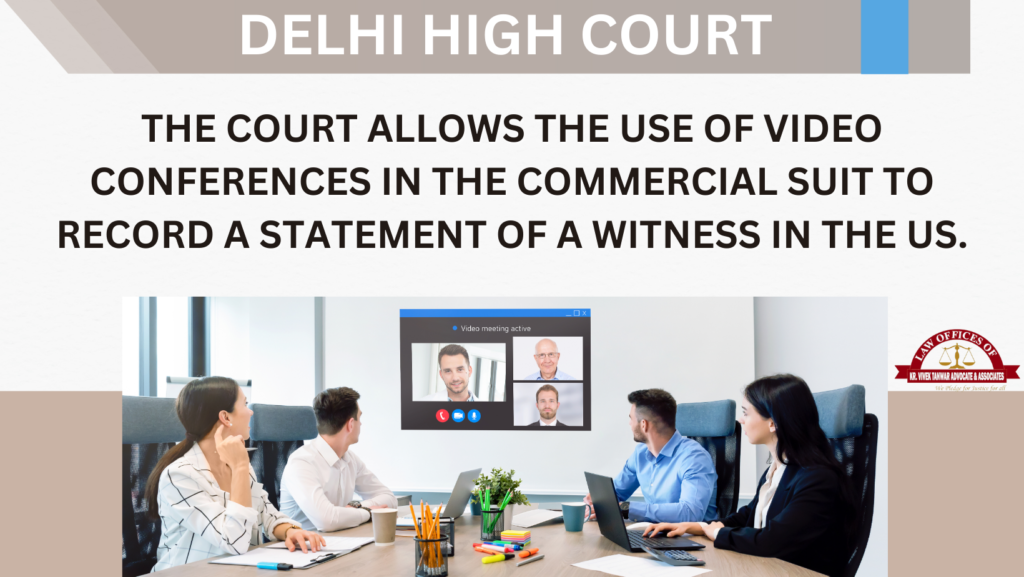Phillips 66 Company v Raaj Unocal Lubricants Limited
In a recent landmark ruling, the Delhi High Court has taken a significant step towards modernizing legal proceedings by allowing the use of video conferencing technology to record statements of witnesses located abroad in commercial suits. The judgment, delivered by Justice Sanjeev Narula, underscores the court’s commitment to ensuring expeditious trials in line with the evolving landscape of technology and global commerce.
The advent of technology has revolutionized various aspects of our lives, including the legal domain. Recognizing the need to adapt to these advancements, the Delhi High Court has embraced video conferencing as a means to enhance efficiency and convenience in commercial litigation. This progressive approach reflects the judiciary’s responsiveness to the challenges posed by cross-border disputes and the globalization of commerce.

Justice Sanjeev Narula, in his insightful judgment, emphasized the paramount importance of facilitating expeditious trials in commercial matters. With businesses operating across international borders, delays in legal proceedings can have far-reaching consequences, impacting contractual obligations, business relationships, and economic interests. By permitting the use of video conferencing to record statements of witnesses residing in the United States, the Delhi High Court has demonstrated its commitment to overcoming jurisdictional barriers and streamlining the litigation process.
The decision to embrace video conferencing technology in commercial suits signifies a departure from traditional courtroom practices. Historically, obtaining testimony from witnesses located abroad has been a cumbersome and time-consuming process, often involving lengthy procedural formalities and logistical challenges. The utilization of video conferencing offers a pragmatic solution to these impediments, enabling seamless communication and testimony without the need for physical presence.
Moreover, the Delhi High Court’s ruling reflects a broader trend towards leveraging technology to promote access to justice and enhance procedural efficiency. Video conferencing not only facilitates the participation of witnesses from distant locations but also reduces costs associated with travel and accommodation. This innovation aligns with the overarching objective of the judiciary to expedite the resolution of disputes and deliver timely justice to litigants.
Importantly, Justice Narula’s pronouncement underscores the need for a balanced approach to the adoption of technology in legal proceedings. While embracing innovation, the court remains mindful of safeguarding the integrity of the judicial process and upholding procedural fairness. The judgment imposes stringent guidelines to ensure the authenticity and reliability of evidence obtained through video conferencing, thereby preserving the sanctity of the trial.
Furthermore, the Delhi High Court’s ruling serves as a testament to India’s commitment to fostering a conducive environment for international trade and investment. By removing procedural hurdles and promoting efficient dispute-resolution mechanisms, the judiciary reinforces the country’s reputation as a preferred destination for commercial transactions. The use of video conferencing not only enhances the ease of doing business but also instils confidence among foreign investors in India’s legal system.
In conclusion, the Delhi High Court’s decision to permit the use of video conferencing in commercial suits marks a significant milestone in the evolution of legal proceedings. By embracing technology to overcome jurisdictional barriers and streamline the litigation process, the judiciary reaffirms its commitment to expeditious trials and procedural fairness. This progressive approach not only enhances access to justice but also reinforces India’s position as a forward-thinking hub for global commerce. As the realm of technology continues to evolve, the judiciary must remain vigilant in harnessing innovation to serve the interests of justice and uphold the rule of law.
Adv. Khanak Sharma

They bridge global healthcare gaps seamlessly.
how to buy generic lisinopril for sale
They never compromise on quality.
Their digital prescription service is innovative and efficient.
buy generic cipro online
A cornerstone of our community.
Their staff is so knowledgeable and friendly.
how to buy cheap lisinopril without rx
Delivering worldwide standards with every prescription.
Generic Name.
where can i get cheap cipro without dr prescription
They offer international health solutions without borders.
A stalwart in international pharmacy services.
lisinopril medication 5mg
Always delivering international quality.